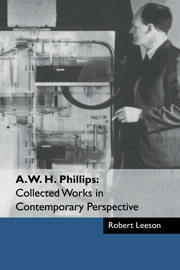Book contents
- Frontmatter
- Contents
- List of contributors
- Foreword by Arthur Brown
- Preface by Robert Leeson
- Part I Bill Phillips: Some Memories and Reflections
- 1 A. W. H. Phillips: An extraordinary life
- 2 The versatile genius
- 3 To be his colleague was to be his friend
- 4 Phillips' adaptive expectations formula
- 5 Economist – washing machine fixer
- 6 Playing around with some data
- 7 The Festschrift
- Part II The Phillips Machine
- Part III Dynamic Stabilisation
- Part IV Econometrics
- References
- Index of names
- Index of subjects
1 - A. W. H. Phillips: An extraordinary life
Published online by Cambridge University Press: 04 May 2010
- Frontmatter
- Contents
- List of contributors
- Foreword by Arthur Brown
- Preface by Robert Leeson
- Part I Bill Phillips: Some Memories and Reflections
- 1 A. W. H. Phillips: An extraordinary life
- 2 The versatile genius
- 3 To be his colleague was to be his friend
- 4 Phillips' adaptive expectations formula
- 5 Economist – washing machine fixer
- 6 Playing around with some data
- 7 The Festschrift
- Part II The Phillips Machine
- Part III Dynamic Stabilisation
- Part IV Econometrics
- References
- Index of names
- Index of subjects
Summary
For the last forty years, applied macroeconomics, in so far as it connects the instruments of fiscal, monetary and incomes policies to the objectives of inflation, unemployment and economic growth, has, to a large extent, been a series of footnotes and extensions to the work of A. W. H. ‘Bill’ Phillips. He was one of the most remarkable economists of all time and was deprived of a Nobel Prize for Economic Science by his ill-health and premature death.
The extant details of Phillips' life are remarkable enough, and can be briefly summarised. He was born on 18 November 1914, at Te Rehunga, near Dannevirke in Southern Hawke's Bay in the North Island of New Zealand. His family generated their own electricity, and this may have stimulated his early interest in ‘things electric’ and in making crystal radio sets. He attended the local primary school and then went on to Dannevirke High School, a daily journey involving a six mile bike ride, a forty-five minute walk, plus a train ride. Phillips acquired a discarded truck, rebuilt and repaired it, and drove it to school every day, until the school authorities intervened.
In December 1929, Phillips passed matriculation, having just turned fifteen. He was too young to go to university and he became an electrical engineering apprentice on the Tuai Hydroelectric Station, one of the first government electricity-generating stations. He supplemented his income by running a ‘Talking Theatre’ in Tuai and the back country, to which he travelled on a motorbike.
- Type
- Chapter
- Information
- Publisher: Cambridge University PressPrint publication year: 2000
- 2
- Cited by



